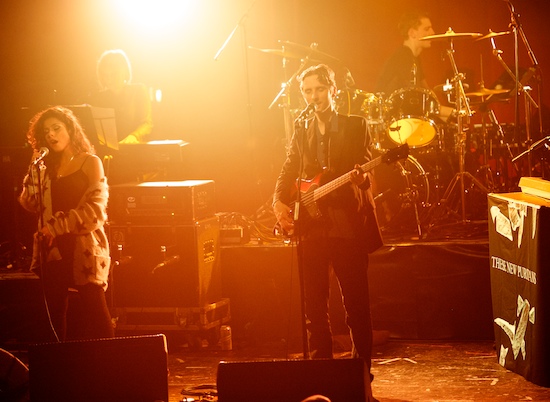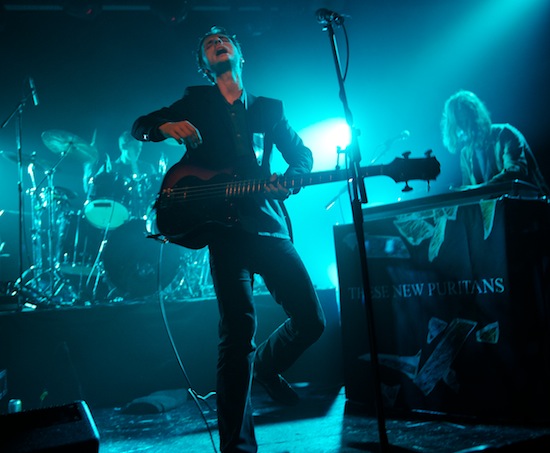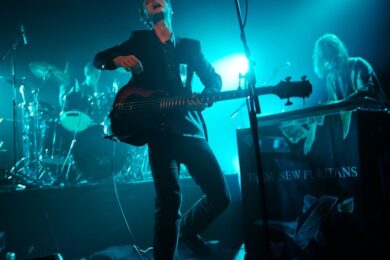Jack Barnett lifts his arms, caressing the air like a shaman provoking a spirit. Approaching solstice, it is a warm night to be ensconced under the arches in this former war hospital and roller disco. The spaciousness of the songs from the band’s just-released album Field Of Reeds sees gaps filled by a chugging air-conditioning system that seems on the verge of a nervous breakdown. But when this music coagulates into the shapes that characterise TNP’s lauded third LP, the hammering of the air-con disappears, leaving Barnett to hold sway over his audience.
Portuguese singer Elisa Rodrigues affects a silken-voiced sulk to his right, balancing out his mumble, and beyond her a horn player, trumpet player and pianist give the songs form. Jack’s twin brother and brawn-for-hire George has less to do on the new material, but the grooves that he locks into, particularly on ‘V (Island Song)’ and ‘Fragment Two’, are essential. Tom Hein is the busiest performer, skittling between sequencers, samplers and effects units, giving magical new forms to Jack’s voice, and introducing excerpts from the album that economic and logistical constraints deem impossible to create live, such as the low rumbling vocal os the lowest voice in the UK, Adrian Peacock.
Whittled down to seven performers, control seems to have been regained from the expansive ambition of the 2010 Hidden concerts, with conductor Andre de Ridder. These shows, although spectacular and often moving, were hybrid affairs, with huge childrens’ choirs, Taiko drums, a large orchestra and brass section, and the Puritans’ mate Rory wearing a lab coat and gleefully smashing cracker-adorned melons to the beat. The central four songs tonight – ‘Three Thousand’, ‘Attack Music’, ‘Drum Courts’, ‘We Want War’ – are taken from the album, and sound punchier, more explosive and portentous than ever.
You might not have thought that the murky, beguiling complexities of Field Of Reeds could be pulled off by this stripped-down group of musicians, but the creeping sense of lump-in-throat wonder that is the album’s pay off is seamlessly recreated here – more than that, it is made flesh. While the album is be considered by some as cold and clinical, here it is engaging, offering out a hand instead of standing back with the aloofness that is often attributed to the band. There is sense of warmth, an embrace that is not often associated with the band, found in George’s hypnotic drumming and the melancholic soul of Jack’s vocal.
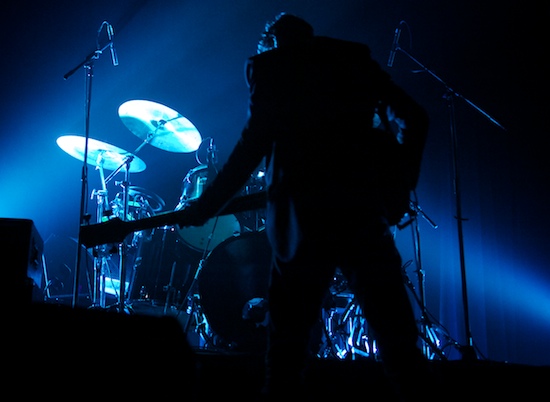
These New Puritans stand accused and revered for roughly the same thing: the majority of reviews, positive or negative, characterise Field Of Reeds as being a slog of a listen, an obfuscating anomaly. The group operate on the still-visible edges of the UK music scene: a cult concern, not underground or lo-fi. Their toil is a glorious, brave, magic(k)al voyage into the sublime for those who see the outfit as the exception that proves the rule that is the depressing lack of ambition, the almost ritualistic horse flogging, that is rock music today. To the detractors, Field Of Reeds displays an awkwardness born out of a disregard of the audience: denigrators of the popular, and therefore of people; old before their time and seemingly drunk on their own depression, they push their suffering onto an unsuspecting public in an almost sadistic act. It is the way culture is discussed in Binary Britain, where even the weather – or rather, public reactions to it – is dichotomous. The question is simple. Field of Reeds: Amazing or shit? In this climate, Jack Barnett is simultaneously a complete genius and a total fraudster. Perhaps he is neither.
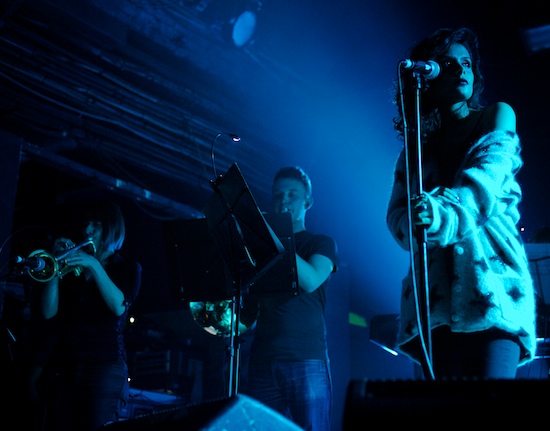
In a desperate scramble to make sense of this strange music, there have been movements by journos to reframe These New Puritans under the umbrella of ‘Contemporary Classical’. The attempt betrays the age, the need to quantify and make sense. Yet this denies the brute power of TNP’s twin engine of Tom Hein and George Barnett, and band leader Jack’s uncanny delivery, that carries echoes of two of rock’s more senior outer-limit dwellers Robert Wyatt and Scritti Politti’s Green Gartside. The set up is still rock (or perhaps even post rock or maybe post prog if you fancy a debate).
After all, These New Puritans hail from the environs of Southend – the most famous sons of which are Procol Harum and Dr Feelgood. The former is famed for heralding prog by fusing classical and rock music to create “Whiter Shade of Pale”, a song out of step enough to prick the ears of a generation. The latter was an uncompromising unit, that used a refusal to comply as a starting point for becoming one of the most influential bands of the 1970s, and indeed an influence on the Barnetts from a young age. These New Puritans can be positioned somewhere in between.
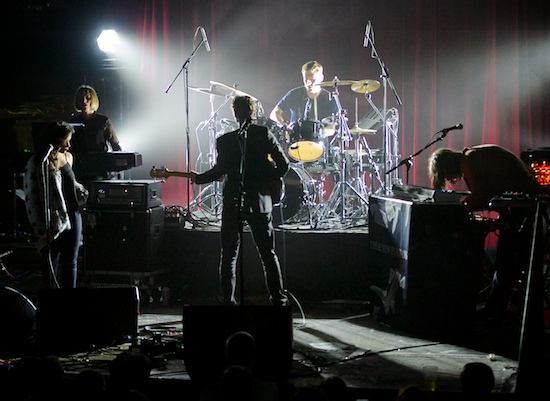
Stern and uncompromising but with a desire to follow romantic impulses, the group are recognised as unique in the musical landscape, and are indeed unique to their own landscape, Thames Estuary Essex. The area is full of discrepancies – between ancient creeks and marshland and the hyper-inflated lives of tech-savvy City commuters who look over them from the vantage point of the train; between the straight-up directness of Essex parlance and the directionless, all encompassing mists that engulf the mouth of the estuary. TNP thrive in such an environment, between the poles of London (centre) and Southend (other). They implicitly mark out the extremities of existence in an all-or-nothing age, filling in the gaps to make humanistic, melancholic work that feels fully realised in the way that not much other ‘art’ music does these days.
While the attack might have subdued, the thrill has been amped up and the directness remains. Towards the end of the set, the icy synthesised refrain ‘Organ Eternal’ echoes around us under the arches. The album’s title track closes the proceedings, a smack-round-the-chops of a song that features the aforementioned bottom-end tones of Mr Peacock. As experience it is guttural, sublime, wholly other. Hail!
